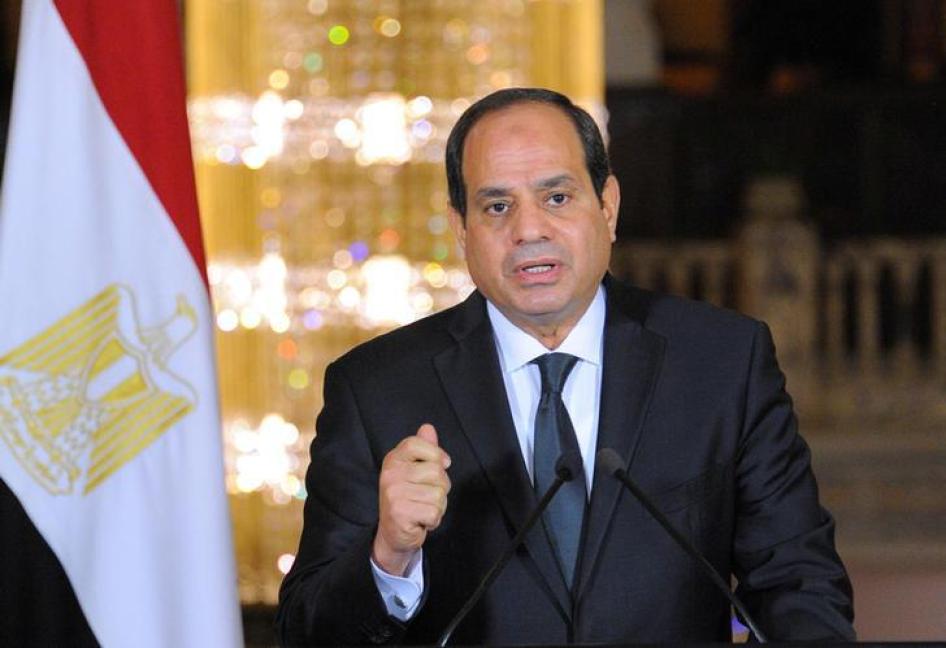On November 4, President Abdel Fattah El Sisi of Egypt inaugurated the World Youth Forum, an international conference hosted in the country’s Red Sea resort of Sharm El Sheikh.
Dozens of Egyptian and foreign officials as well as hundreds of foreign and Egyptian youth—many of whom Egypt luxuriously funded to come—attended the conference organized under the catchy phrase “We Need to Talk.”
The question is, talk about what?
Sisi’s inaugural speech left no mystery about his priorities. He immediately began with his favorite subject, terrorism, and proceeded to propose a novel legal innovation to confront it. He declared that “combating terrorism is a human right, a new right that I am adding to human rights in Egypt.”
Many Egyptians, whose voices are excluded from such conferences, say they would rather talk about the array of existing rights they cannot practice, or have found themselves thrown in prison for attempting to exercise.
These include the rights to free expression, freedom of information, freedom to peacefully assemble and protest, and the right to fair minimum wages. As Egyptian rights groups, Human Rights Watch, and others have documented these serious abuses in great detail, it’s also worthwhile to examine Sisi’s “contribution” to human rights law further.
Egypt does face real security threats. But international law already stipulates clearly, and in great detail, the rights of authorities to take “exceptional” measures in times of crises, although only for a defined period of time and without undermining certain basic rights.
It does not, however, include such thing as the right to “fight.” Rather, it talks of the right to security, and, in African human rights law, it speaks about the “right to peace.”
Egypt’s president wants to turn this state of exception into a permanent reality, and he is trying to use the threat of terrorism to gain international approval as his government demolishes the country’s independent organizations and extinguishes its citizens’ aspirations for democratic and accountable governance.
But Egypt’s western allies should long ago have been wise to the fact that the country’s autocratic leaders exploit the rhetoric of security to dismiss rights issues, not to engage with them.
No one is keeping the Egyptian government from “fighting terrorism.” So what actually underlies Sisi’s rhetoric?
Sisi and Egypt’s ruling elite seem to believe that terrorism cannot be fought without crushing rights. Their position is that opposing the government is the same thing as being “a terrorist,” and that the rule of law is just an obstacle to ensuring security.
They swing between denying that human rights abuses exist and, less often, asserting that Egypt faces “special circumstances” and that such rights must be “understood in its true context of a country in Egypt’s situation,” as Sisi once said.
In sum, Sisi believes in Egyptian exceptionalism. But not the kind of exceptionalism that manifested itself in Tahrir Square in 2011 and engendered global popular admiration for Egyptians’ largely peaceful struggle against an autocratic government. Rather, Sisi and his government contend that only autocracy and despotism can ensure Egypt’s security and stability.
So while the government was ensuring that its guests enjoyed the sunny beaches of Sharm al-Sheikh, one more Egyptian, Gamal Soroor, died in custody like dozens of others in the city of Aswan.
Soroor was not a “terrorist,” nor was he convicted of any charges. He was held arbitrarily and kept in pretrial detention, like thousands of Egypt’s political detainees, because he decided to use Egypt’s traditional “dof” drum to peacefully protest government land policies in his city.
While many of the hundreds of youth who came from all over the world to Sisi’s conference were given incentives to participate, many Egyptian youth lie in prisons in dismal conditions for daring to disagree with their government.
Egypt’s western allies, including France, the US and UK, have been buying Sisi’s false narrative almost wholesale. But they should understand that his view of security and human rights reflects the root of Egypt’s despotic establishment for the past three decades; it’s the same thinking that shaped the policies that ignited the country’s 2011 uprising.
Let’s not forget that during Egypt’s 2011 uprising, Omar Suleiman, former president Mubarak’s intelligence chief for decades, responded to a question of whether he believed in democracy with, “For sure! Everybody believes in democracy… but when?”
Between Sisi’s “combating terrorism is a human right” and Suleiman’s trope about Egyptians not being ready for democratic governance, Egypt’s allies should honor and support Egyptians, not their autocratic rulers.
They should respond by conditioning their support for Sisi’s government on tangible improvements in human rights. They need to realize that their acceptance of Sisi’s worldview—whether genuine or on realpolitik terms—invites more abuse and suffering for ordinary Egyptians in the short-term.
These are the same Egyptians who—unable to talk freely in mainstream media—bravely and audaciously leapfrogged onto the youth conference’s hashtag #WeNeedtoTalk to express their opinions and discuss government abuses.
In the long-term, Egypt’s western allies are undermining the very stability of Egypt they claim to be protecting through their misguided indulgence of Sisi’s brutal repression.
As for president Sisi, you do need to talk to ordinary Egyptians. But like all meaningful conversations, you also need to listen to those who criticize you, not just those who applaud.










